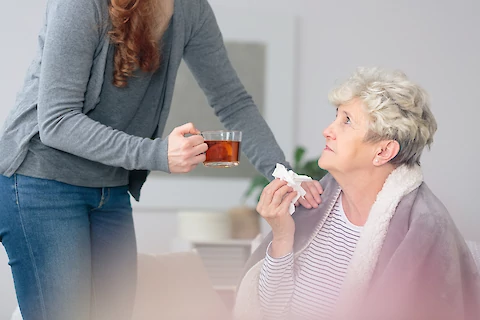
As a family caregiver, the onset of flu season can pose unique challenges and responsibilities, especially when caring for your senior loved one. It's not just about keeping them warm and comfortable but also about taking proactive measures to shield them from potential risks. Preparation is your greatest tool. With the right information, you can navigate flu season with confidence. You need strategies that cover everything, such as ensuring vaccinations are up-to-date, maintaining a clean environment, adopting strict personal hygiene practices, and recognizing flu symptoms quickly.
The Importance of Vaccinations
Flu vaccinations are often the first line of defense, particularly for seniors whose immune systems are more susceptible to infections. Keeping their vaccination schedules up-to-date significantly reduces the odds of catching the flu. Consult a healthcare provider about the best time to receive the vaccine, and remember, it takes roughly two weeks post-vaccination for the body to develop full immunity.
Maintaining a Clean Environment
Cleanliness is another key component to prevent the spread of flu. Viruses survive longer on hard surfaces, so regular cleaning of frequently touched objects like doorknobs, light switches, remote controls, and kitchen utensils is crucial. In addition, ensuring seniors live in a well-ventilated space can also help to lower flu transmission rates.
Personal Hygiene Practices
Besides maintaining a clean environment, adhering to good personal hygiene habits is equally important. Encourage your seniors to wash their hands frequently with soap and warm water or use a hand sanitizer when that is not possible. They should also be reminded to avoid touching their face as much as possible and to cover their mouth when coughing or sneezing to prevent the spread of germs.
Identifying Flu Symptoms in Seniors
Understanding flu symptoms is vital in protecting our senior loved ones. Common symptoms include high fever, cough, sore throat, body aches, and fatigue. It's worth noting, however, that seniors may not exhibit traditional flu symptoms. Instead, they may experience confusion, dizziness, or even fall more than usual. Therefore, caregivers need to pay extra attention.
The Need for Prompt Medical Care
When a senior shows flu symptoms, prompt medical care can be a lifesaver. Seniors are at high risk for complications such as pneumonia, bronchitis, and sinus infections. Thus, immediate medical intervention may prevent these conditions from worsening and ensure a faster recovery.
Stocking Up on Essential Supplies
Having essential supplies on hand, such as tissues, sanitizers, over-the-counter medicines, and nutritious food, can help manage the illness effectively. You want to be well-stocked ahead of the winter months when seniors might be most vulnerable to the flu.
Get Premium Senior Care Support
Safeguarding our seniors through flu season requires commitment, vigilance, and, most importantly, preparation. Utilizing these strategies will ensure you're ready to navigate this challenging season. For caregivers in Greenfield, Indianapolis, and Anderson, Senior Helpers Greenfield is here to assist you. Our professional caregivers are trained to provide a safe and healthy environment for your senior loved ones. Contact us today for more information on our services that aim to make your caregiving journey less stressful and more rewarding.